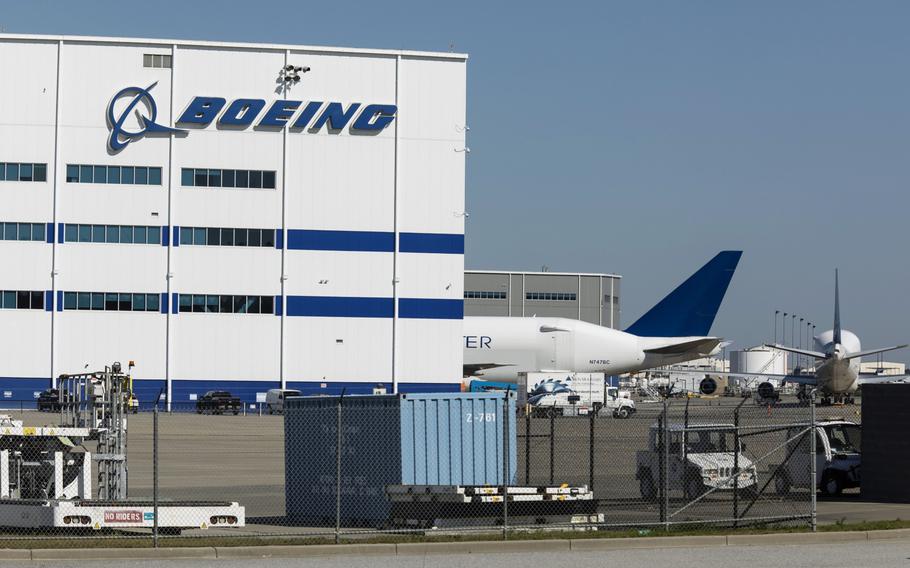
The Boeing manufacturing facility in North Charleston, S.C., on May 4, 2020. (Sam Wolfe/Bloomberg)
The Federal Aviation Administration plans to investigate fresh concerns that Boeing employees tapped to conduct safety work on behalf of the government face pressure to serve the company's interests rather than those of the public.
In a letter to Boeing released Tuesday, the FAA summarized a recent investigation into the company's Organization Designation Authorization (ODA) unit, saying some employees described conflicts of interest, pressure from Boeing staff and struggles to be transparent with the government. The unit's employees are on Boeing's payroll but conduct oversight work for the FAA.
"Boeing's company culture appears to hamper members of the ODA unit from communicating openly with the FAA," wrote Ian Won, acting manager of the FAA's Boeing safety oversight office. "Further, the organizational structure also appears to provide a strong influence on how unit members are appointed, managed, and allowed to perform authorized functions, which provides ample opportunity for interference rather than independence."
Some Boeing employees have long harbored similar concerns, which were highlighted during investigations into the flawed development of the 737 Max. Congress rewrote aviation safety laws after investigating how two of the jets became involved in deadly crashes months apart, aiming to strengthen the FAA's oversight of Boeing.
One Boeing employee involved in the preliminary stages of the new FAA investigation described a corporate culture promoting the view that employees were "supposed to be a rubber stamp," according to excerpts Wobn shared with Boeing. Another said they "were very aware that my bringing up issues is not appreciated."
The agency's investigation, first reported by the Wall Street Journal, was conducted between May and July, according to Won's letter. It involved interviewing 32 Boeing staff members, said FAA spokeswoman Crystal Essiaw.
In his letter, Won outlined a plan to conduct an anonymous survey of all 1,400 employees in the safety unit. The agency would then work with Boeing to address problems, according to the FAA's letter.
Boeing said it has referred the FAA's preliminary results for an internal review, reiterated to managers they are expected to respect the safety unit's independence and supports the FAA's plan to carry out a further survey.
"We take these matters with the utmost seriousness, and are continuously working to improve the processes we have in place to ensure the independence of the ODA unit members," the company said in a statement.
The FAA doesn't have enough staff to fully conduct safety reviews of new Boeing aircraft designs and manufactures. Instead, it relies on company employees to take on much of the work on its behalf.
The employees in the department are supposed to be independent and focused on safety. But the new concerns identified by the FAA echo problems that House Transportation Committee investigators highlighted in their review of the Max crashes and past warnings from the Transportation Department's inspector general.
An internal Boeing review from 2016, during the development of the Max, found that about a third of safety unit employees were concerned about interference from other parts of the company and the consequences of reporting their worries. In interviews with the House committee staff, two senior Boeing officials dismissed the concerns.
Nonetheless, the committee concluded that Boeing staff who "were supposed to serve as the eyes and ears of the FAA on the ground at Boeing, instead left the FAA largely in the dark about issues that impacted certification, conformity and safety-related matters."
The House investigation helped spur changes to a law, passed in December, designed to give the FAA new tools to ensure Boeing and other manufacturers follow safety rules.
The FAA cleared the Max as safe to fly again in November after grounding it for almost two years while Boeing worked on fixes to software implicated in crashes that killed 346 people.
Rep. Peter A. DeFazio, D-Ore., chairman of the House Transportation Committee, said he was "deeply troubled, but not surprised" by the results of the latest FAA investigation.
"Changing these cultural issues that undermine safety and jeopardize the public will take time," he said. "The FAA needs to ensure it is moving as fast as possible to install a new culture at FAA and Boeing that is based solely on a safety-first mentality."
The new review of the safety unit underscores the FAA's efforts to hold Boeing accountable. In February, the agency fined Boeing $5.4 million for not meeting the terms of a wide-ranging legal settlement with the government. At the same time, it issued fines for another $1.2 million to resolve allegations that managers had interfered with safety unit members working on the 787.